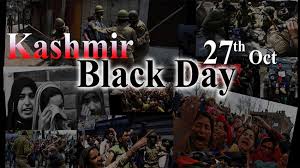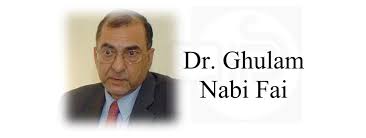 Imagine you are living in a land where your fundamental rights are denied, where military occupation defines every aspect of your existence, and where your voice is silenced in deciding your own future.
Imagine you are living in a land where your fundamental rights are denied, where military occupation defines every aspect of your existence, and where your voice is silenced in deciding your own future.
This is the harsh reality faced by the people of occupied Jammu and Kashmir. Since October 27, 1947—Kashmir Black Day—Indian forces have occupied the region, sparking a conflict that continues to this day. For more than seven decades, the Kashmiri people have been denied their right to self-determination, a right enshrined in international law and backed by multiple United Nations resolutions. Kashmir Black Day is a solemn reminder of the broken promises, the continuous struggle for freedom, and the international community’s moral obligation to intervene.
October 27th marks the tragic beginning of the Kashmiri people’s long and painful struggle.
It was the day in 1947 when the scenic Kashmir Valley transitioned into one of the bloodiest battlefields in modern history. On this day, the freedom of the Kashmiri people was stolen, and since then, they have not lived normal lives but instead have struggled to survive in a state of perpetual captivity. The Kashmir issue remains the longest unresolved dispute in the world, with numerous dimensions. The people of Kashmir continue to pay the heavy human cost for their quest for the right to self-determination. The dark chapter of Kashmir’s history began when Indian troops entered and occupied the region, triggering a conflict that has left the Kashmir issue unresolved to this day.
The roots of this conflict go back to the partition of the Indian subcontinent in 1947, when princely states were given the option to join either India or Pakistan. Maharaja Hari Singh, the ruler of Jammu and Kashmir, hesitated to make a decision. On July 19, 1947, the Muslim Conference passed a resolution urging the Maharaja to accede to Pakistan, reflecting the will of the Kashmiri people. However, the Maharaja delayed his decision, and while he vacillated, Indian troops invaded Kashmir, claiming to possess an Instrument of Accession which was declared illegal by people of Kashmir.
Despite India’s assertions, the document of controversial Instrument of Accession has never been presented at the United Nations Security Council (UNSC).
This marked the beginning of militarization in the region, setting the stage for decades of unrest and conflict. India took the issue to the UNSC, asserting that the region had legally acceded to its territory. In response, the UNSC passed Resolution 47 on April 21, 1948, and later Resolution 98, which called for a plebiscite to allow the people of Kashmir to determine their own future. Despite these resolutions, the promised plebiscite has never been held.
India has consistently denied Kashmiris their right to self-determination, declaring Kashmir an integral part of India. By maintaining this narrative, India has evaded holding an impartial plebiscite in Kashmir, thus retreating from the commitments made under United Nations resolutions. After tensions escalated between the Indian government and Sheikh Abdullah over the resolution of the Kashmir issue, India imprisoned Abdullah and passed a controversial legislative resolution in 1952 that fraudulently claimed Kashmir’s accession to India. This act was a blatant violation of the UN resolution of March 1951, which called for a fair and impartial plebiscite. In response to this illegal maneuver, the United Nations reiterated its stance in its January 20, 1957 resolution, affirming that any future settlement of Kashmir must reflect the will of its people.
Pakistan has always prioritized the Kashmir issue, supporting Kashmiris in their quest for self-determination, identity, land, and basic rights. Pakistan has continuously pushed the UNSC to implement its resolutions for a plebiscite in Kashmir and has tirelessly advocated for Kashmir’s freedom through diplomatic campaigns on international platforms. However, the international community, swayed by India’s economic clout, has largely remained silent, reinforcing the grim reality of “might is right.”
Another horrific event that underscores the unresolved nature of this conflict is the Jammu Massacre, where thousands of lives were lost, leaving deep scars on the collective memory of the region. This massacre continues to symbolize the gross injustice inflicted upon the Kashmiri people and underscores the urgent need for accountability.
The Kashmir issue is not only about territory; it is a matter of human dignity, the right to self-determination, and the need for justice. The international community must act now to resolve this long-standing dispute by facilitating a fair and impartial plebiscite under the supervision of the United Nations, as promised in multiple UNSC resolutions. Only then can the Kashmiri people hope to reclaim their future and their freedom.
For Kashmiris, October 27 remains a day of mourning, symbolizing broken promises and ongoing suffering. The international community must not ignore the humanitarian crisis in Kashmir. Justice, peace, and the right to self-determination must be at the heart of any solution. Only by respecting the rights and aspirations of the Kashmiri people can a lasting resolution be achieved.
–Qurrat ul ain Dabeer Kazmi is a student of Peace and Conflict Studies at NDU and an intern at Kashmir Institute of International Relations.








